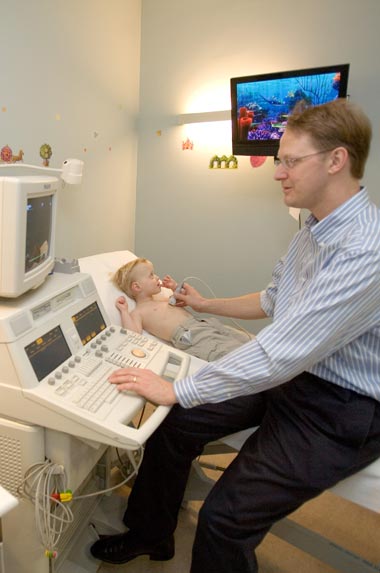Echocardiogram
What is it?
A test routinely performed by the cardiologist or echo technicians to provide views of the heart. It is a type of ultrasound scan called an echocardiogram or echo when it is performed on the heart. High frequency sound, too high to hear, is beamed at the heart and the reflection is viewed as an image on a screen, rather like sonar in submarines. As well as structural information about the heart, use of a technique called Doppler allows the speed and direction of blood in the heart to be ascertained, shown as a coloured image on the screen or as a waveform.
The technique is now the mainstay of diagnosis in heart disease that children are born with (congenital heart disease) and is performed in most infants and children with a diagnosis of a heart (cardiac) condition. Information can be gathered about the 3-D structure of the heart. As echocardiography shows moving images, an appreciation and quantification of cardiac function can ascertained. The effects of medical and surgical treatment can be observed simply and safely.
What is going to happen?
It is preferable for the infant or child to lie down on the examination couch for the duration of the procedure. In uncooperative babies, it may be possible for them to lie in their mother's arms during the scan. Bottle or breast feeding during a scan is sometimes advantageous to pacify the child.
Special ultrasound water-based gel is placed on the echo transducer (probe) or the child's chest and the transducer placed at various points on the chest and upper abdomen. Very light pressure is applied to the transducer onto the chest wall to optimise the image, but the procedure is not painful.
Parents are usually present for this investigation. An explanation of the findings is usually given at the end of the scan.
How do I feel during the procedure?
Other than gel on the chest and light pressure from the transducer, there is no sensation. The ultrasound cannot be felt or heard. Infants and children often fall asleep.
How long does it take?
The scan will last from 5 to 30 minutes, depending on the complexity of the heart defect and the cooperation of the child.
Are there any side effects?
No conclusive adverse effects have been proven. Millions of ultrasound scans have been performed worldwide.

